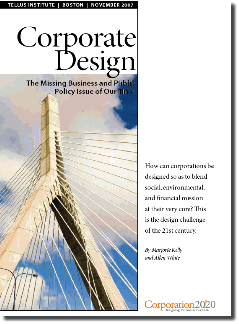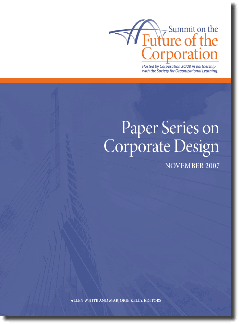- © The Jus Semper Global Alliance

Corporation 20/20 acts as:
The initiative is premised on the view that societal expectations and needs in the 21st century demand greater corporate focus on urgent global imperatives--economic, environmental, and social. In the face of both peril and promise for the future, it is no longer enough to ask, "What is the business case for social responsibility?" Now the question must become, "What is the social purpose case for business?" Click on the logo to go to Corporation 20/20
CORPORATE DESIGN. THE MISSING BUSINESS AND PUBLIC POLICY ISSUE OF OUR TIME
These principles seek to address the imbalance caused by nearly two centuries of legal decisions and corporate practices, which together have expanded the rights of corporations without a commensurate expansion of their obligations. Elaborating on the subject, Corporation 20/20 has just published a report that explores different routes for redesigning the purpose of business, describing the roles that the different stakeholders may adopt towards this objective. The authors, Marjorie Kelly and Allen White, argue that implementing these principles in the 21st century requires the true commitment of business, governments and civil society. Corporate redesign seeks to change the narrow purpose of business inherited from the 19th century: shareholder value, to now place at the same level -as the first principle declares- the responsibility of serving the public good. Why does society allow corporations to exist? To serve the public good. Why do individuals start corporations? To serve their own interests. Effective design knits these two together. In this way, the first principle articulates an emerging social consensus: corporations have social responsibilities, and when those conflict with profit-making, without a doubt, the public good comes first. In sync with Jus Semper's position, the purpose of democratic societies must be the long-term and dignified sustainability of people and planet. The market must only be a mean to this goal and not its end, as it is today. The authors correctly consider that resistance to such changes should not be underestimated. Parties with a vested interest in the status quo will undoubtedly oppose corporate redesign. Yet, from a broader societal perspective, the authors tell us that there is no choice. There is simply no doubt that, as dominant institutions in society, corporations have societal obligations. Thus, shaping future corporate forms to honour these obligations is the design imperative of the 21st century. In this way, the authors conclude their report by further exploring the subject, envisioning the roles that different stakeholders may adopt and illustrating them with case studies of real businesses that were designed with human welfare as their main purpose. Download the report on corporate redesign here!
PAPER SERIES ON CORPORATE REDESIGN PRESENTED DURING THE SUMMIT OF CORPORATION 20/20 This document offers a collection of ten papers exploring key components of corporate design, prepared to set the stage for The Summit on the Future of the Corporation. All papers seek to answer this question: What would corporations look like that were designed to seamlessly integrate social purpose into the core of the organisation? Rather than constraining themselves to a debate between government regulation and free markets, these essays explore the design of a new business system: structure, culture, management practice, ownership control, business and investment law, as well as the key role of stakeholders, from consumers to investors. The papers depart from conventional wisdom to foster dialogue and action among an ever-growing circle of citizens who believe that corporations can and must play a pivotal role in achieving a sustainable future.
|

| Home |  | Resources |  | Corporate Activity |  | Corporation 20/20 |




